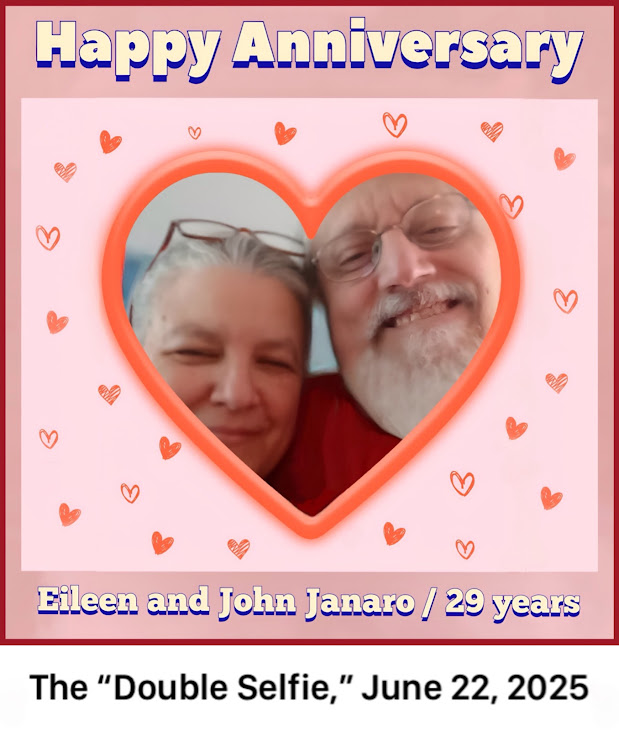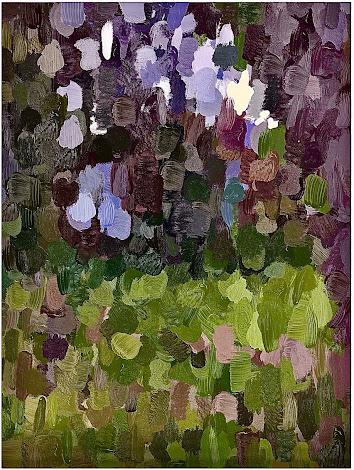Ah, the Solemnity of Saints Peter and Paul.
So many things could be said about these two Apostles—whose ministries were so fundamental for the whole Church—and the different stories of their martyrdom (both in the Imperial Capital) in the decade of the '60s in the first Christian century.
I would like to dwell on the particular memories of two Roman pilgrims who were both present in the huge congregation of Saint Peter's Basilica for the Liturgy of today's feast 29 years ago, in 1996. They were newlyweds, who were beginning the great journey of their married life with a grand adventure of travel through the Italian peninsula, starting in Rome.
Eileen and I both consider ourselves "Romans" by virtue of the (different) times we each lived and studied there in our youth, as well as by our pilgrimage/excursion together at the beginning of our married life. The special significance of the Eternal City has also extended to the next generation of Janaros. Our four university graduates all participated in the Semester in Rome program, and two of them shared crucial moments together with their future spouses during their time in the city of La Dolce Vita. John Paul and Emily began dating in Rome in 2018. Lucia and Mike became engaged in the piazza of Saint John Lateran on a lovely spring day in 2021.
But returning to the original John-and-Eileen story: we spent three and a half weeks in Italy for our honeymoon back in 1996. We were able to make this beautiful and multifaceted trip because we didn't seek a "lovers' solitude" experience; we spent all but five nights at the homes of friends (we had—and still have—lots of Italian friends). We are both Italophiles (and overall Europhiles), and I have Italian heritage from my immigrant ancestors.
It was a real trek, from Rome to Assisi to Florence to Ravenna to Milan to the Italian Riviera. I'm so glad we did it then, when we had the time and the energy of our youth (well, relative youth—as I noted last week, I was 33 and she was 29). I'm glad that, while we were still able and vigorous, we rode trains and buses, hiked steep ancient cobblestone streets, prayed in venerable churches and marveled at great works of art, hauled bags that got bigger and bigger as we accumulated loot along the way, got local tours from our friends and tips about the best hole-in-the-wall restaurants, and slept on floors or (worse) the infamous Italian "letto" that rolls out at night from under the sofa. We had a blast, and we also had plenty of time for "romance."I recommend this kind of honeymoon for you young folks, especially if you are both ardent humanities buffs like us. Trust me, you will never be able to throw yourselves about with such freedom as in these early days of marriage. Soon come the babies, and then come the bad backs and the arthritis. Youth is the time to explore, to rough it, to have an adventure, especially with your spouse. Go somewhere beautiful and fascinating, full of human history and aesthetic richness. Or go on pilgrimage to the places where God's love has touched the world. You will build a foundation of common experience that will stay with you forever.
In Rome we spent a week and a half at an apartment not far from the Vatican, with a friend's mother. This lovely old woman cleared a room for us, made coffee for us every morning, and often fed us abundantly in the kitchen at night (even if we had already eaten). I have never found a restaurant that can match the culinary magic that happens in the simple Italian kitchen. Oh, my my!We went to all our favorite spots in Rome and shared them together. We brought our gratitude and hopes for our newly married life to the tomb of Saint Peter, and prayed there for a good long time. We explored churches and ruins and great art. June 29th sticks in my mind because we went to Saint Peter's basilica for the ceremony in which the Pope (then Saint John Paul II) invests new Archbishops with the pallium, a woolen band worn as a sign of their particular responsibility and their communion with the Pope.
It was a beautiful ceremony, very crowded of course, so that we barely had a glimpse of the Pope (we had no idea that we were going to meet John Paul II a few days later, embrace him, speak to him, and receive his blessing on our married life—but that's another story that I've blogged about before).
June 29th is the feast celebrating the Apostles who founded the "local" Church of Rome (whose Bishop, through Peter, preserves to this day the primacy of teaching and jurisdiction that enables Popes to serve the truth and unity of the whole Church). We were so happy just to share in this beautiful event with John Paul II and his brother Archbishops in a liturgy that in a special way was dedicated to the service of ecclesial communion and solidarity.We knew that we were called, within our marriage union and its (then future) fruition of family life, to serve and build up ecclesial communion in our own way, among ourselves and with the people entrusted to us in our daily lives "on the roads of the world."
After the liturgy and in the midst of the crowds in front of Saint Peter's Basilica, we bumped into a new Archbishop from Malaysia. He spoke English, and so it was easy to strike up a conversation with him. He was a bishop from the “other side of the world” who was nevertheless someone with whom we could rejoice on this patronal feast of the Church of Rome — someone we recognized in that moment as an esteemed spiritual father and brother. We asked for and received his blessing; thus this kindly Malaysian man became the first bishop to bless our marriage. Thinking about this after 29 years, I don't even remember his name.
But Rome is like that. It's more than a gorgeous city steeped in over two thousand years of history, and containing some of the greatest artistic treasures in the world. Rome is the center of a Catholic Church that is more and more extensively embodying its "universal" character. Rome is a place of beautiful and surprising encounters with people from all over the world. We find ourselves united in Christ's Mystical Body, and journeying together toward His glory. We will never forget these experiences of 29 years ago with people from all over the world, with people walking together with Jesus according to His mysterious design for each one of us.
Rome is a place where people discover that they are not alone.































